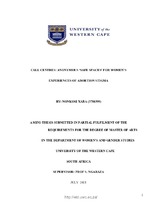| dc.description.abstract | In South Africa, abortion became a right in 1996 in terms of the Choice on Termination of
Pregnancy Act, 92 of 1996 (CTOP). However, despite this legal dispensation, debates between
pro-life (those against abortion) and pro-choice (those supportive of the law) have continued
unabated in liberal South Africa. These debates have resulted in severe stigma for women who
choose to terminate their pregnancies. The discourse is shaped by an array of personal,
religious, cultural and other social beliefs that differ from community to community. Research
shows that access to free post-abortion services is further complicated for women, especially
young women, by privacy concerns, the negative attitudes of institutional service providers,
and stigma. | en_US |

